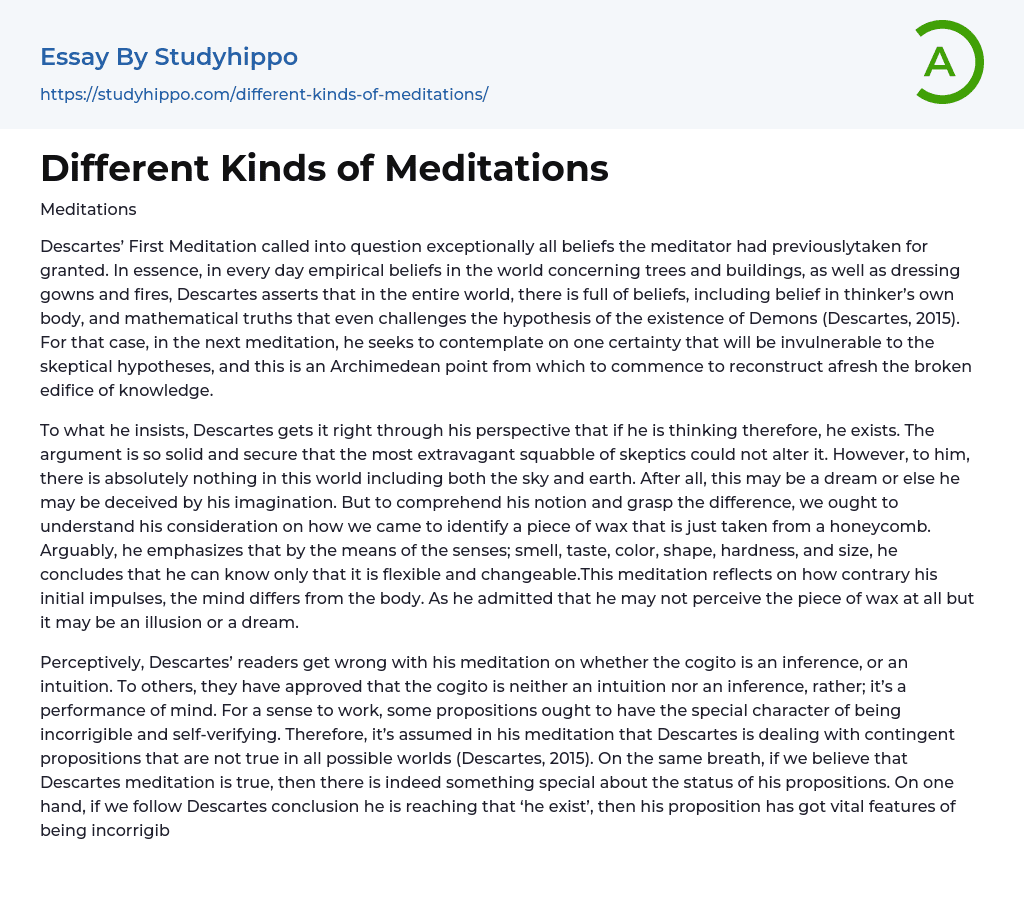Meditations
Descartes’ First Meditation cast doubt on all previously assumed beliefs of the meditator. Essentially, Descartes argues that every empirical belief about the world, such as trees, buildings, dressing gowns, and fires, is full of doubts. This includes beliefs in one's own body, mathematical truths, and even the existence of Demons (Descartes, 2015).
In the following meditation, the individual aims to reflect on a single certainty that cannot be affected by skeptical theories. This certainty serves as a starting point to rebuild knowledge. Descartes correctly asserts that if he is thinking, then he must exist. This argument is so strong and indisputable that it cannot be challenged by even the most extreme skeptics. Nevertheless, Descartes believes that there is nothing in existence, including both the sky and earth.
After all, this ma
...y be a dream or the person may be deceived by their imagination. However, in order to understand their idea and comprehend the distinction, we must grasp their perspective on how we can identify a piece of wax that has just been taken from a honeycomb. According to them, this is primarily done through the senses; smell, taste, color, shape, hardness, and size. Based on these observations, they conclude that they can only perceive the wax as being flexible and changeable. This contemplation delves into the contrast between their initial instincts and how the mind differs from the body. They acknowledge that they may not be perceiving the piece of wax at all and that it could potentially be an illusion or a dream. Interestingly, Descartes' readers often misunderstand his thoughts on whether the cogito is an inference or an intuition.
According to some, the cogito is seen
as a performance of the mind rather than an intuition or inference. For a sense to function, certain propositions must have the qualities of being incorrigible and self-verifying. Descartes, in his meditation, assumes that he deals with contingent propositions that are not universally true (Descartes, 2015). If we agree with the truthfulness of Descartes' meditation, there is something distinct about the status of his propositions. On one hand, if we accept Descartes' conclusion that "he exists," then his proposition possesses essential characteristics of being incorrigible and self-verifying. On the other hand, when considering his premise that "he thinks," there is no clear answer and it can be approached from two different angles.
The content in the meditations is based on the mind's conceptions, and there is a specific reason why the statement 'I think' does not have special features like the statement 'I exist'. The method of doubt in the First Meditation differs from the knowledge in the Second Meditation and leads to discovering something that cannot be doubted. If successful, Descartes has discovered that thinking is the essence of the mind and being extended is the essence of matter.
Reference
- Descartes, R. (2015). Meditations on second philosophy.Central Works of Philosophy Central Works of Philosophy is a multi-volume set of essays on the core texts of Western philosophical tradition. From Plato s Republic to present day, volumes range over 2,500 years of philosophical writing covering best, most representative, and most influential work of some our greatest philoso, 15.
- American Football essays
- Athletes essays
- Athletic Shoe essays
- badminton essays
- Baseball essays
- Basketball essays
- Benefits of Exercise essays
- Bodybuilding essays
- Boxing essays
- cricket essays
- Fight club essays
- Football essays
- go kart essays
- Golf essays
- Gym essays
- hockey essays
- Martial Arts essays
- Motorcycle essays
- Olympic Games essays
- Running essays
- scuba diving essays
- Ski essays
- snowboarding essays
- Soccer essays
- Sportsmanship essays
- Super Bowl essays
- Surfing essays
- Swimming essays
- Table tennis essays
- Taekwondo essays
- Tennis essays
- Training essays
- Volleyball essays
- wrestling essays
- Yoga essays




